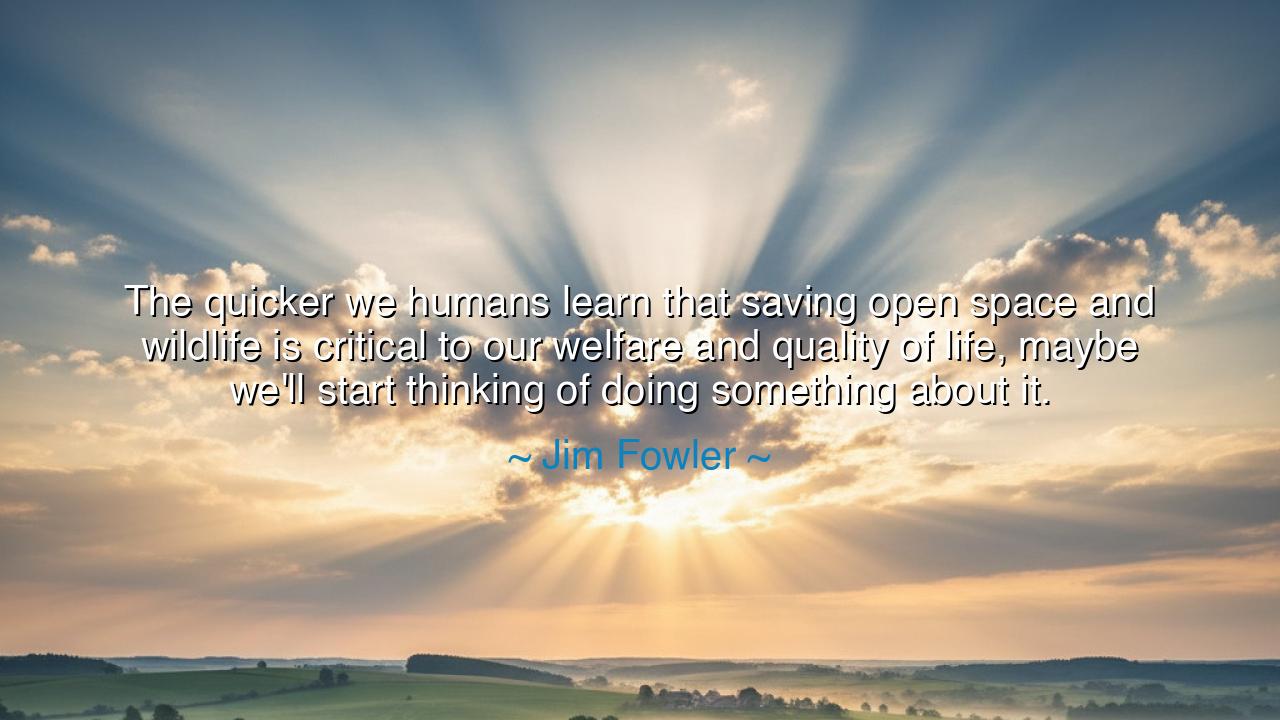
The quicker we humans learn that saving open space and wildlife
The quicker we humans learn that saving open space and wildlife is critical to our welfare and quality of life, maybe we'll start thinking of doing something about it.






Hear the field-naturalist’s warning set like a sign at the edge of a vanishing meadow: “The quicker we humans learn that saving open space and wildlife is critical to our welfare and quality of life, maybe we’ll start thinking of doing something about it.” In a single breath, Jim Fowler binds beauty to necessity. He tells us the song of the meadowlark is not an ornament but a ligament; that emptiness on the map is not waste but wealth; that the living world is not scenery—it is structure. When we forget this, our houses stand on borrowed beams.
The ancients would have understood. They laid cities with respect for water and wind, for pasture and grove. They knew that open space lets rivers breathe and soils drink; that wildlife is not a luxury but a laborer—pollinating, pruning, cycling the hidden economies beneath our feet. To call these things “critical to our welfare” is to speak plain truth: clean lungs from clean air, full tables from fertile ground, steady hearts from places where silence is a physician. Our quality of life is braided to the untamed; if we sever it, we fray.
Mark a story that bears this seal. When wolves were returned to Yellowstone, the park learned to breathe in a new tempo. Elk moved, willows rose, beavers built, ponds gathered light, birds nested, banks held fast. A single thread rewove a torn tapestry. This was not magic; it was systems remembering themselves. The lesson is stern and generous: protect the whole, and the parts will prosper; lose a keystone, and the arch forgets how to stand.
Or recall a city forged of granite and will: Central Park set aside in the heart of appetite, defended across centuries against schemes of quick coin. There children learn seasons by touch, elders find shade for their stories, and storms spend their anger in earth that can drink. Property values rose as if tipping a hat to common sense; ambulances ran fewer heat calls where trees kept vigil. Here is open space paying dividends to a people who refused to pave everything they loved.
Why, then, do we delay? Because the profits of ruin arrive in one quarter, while the profits of restraint arrive in one generation. Because a bulldozer is louder than a thrush. Because we have learned to count what is priced and ignore what is priceless. Fowler’s clause—“the quicker we learn”—is a clock on the wall: if understanding comes soon, our children inherit lilies and loons; if late, they inherit photographs.
Let the lesson be carved like boundary stones: to secure our welfare, we must keep room for the world beyond our fences; to raise our quality of life, we must respect the lives that are not ours. A healthy city has edges where foxglove and fox still trade glances; a wise nation counts acres unbroken as part of its treasure. To save wildlife is to save ourselves from poverty of spirit and from the cascading debts of broken ecologies.
And now, the path beneath our feet: (1) Guard open space in law—greenbelts, easements, and corridors that stitch habitats across maps. (2) Restore—replant natives, daylight buried streams, let rivers meander where they must. (3) Make room for wildlife in design—dark-sky lights, pollinator strips, fish passages, living shorelines. (4) Buy with conscience—food from soils that heal, wood from forests that remain forests, travel that pays its rent. (5) Teach the young to know the names of the near—tree, bird, wind—so love has handles. (6) Count what matters—canopy cover, species returned, heat islands cooled—and praise those numbers in public. Do these steadily, and we will become the people Fowler imagined: quick to learn, quicker to act; a people whose prosperity walks hand in hand with the green world that makes it possible.






AAdministratorAdministrator
Welcome, honored guests. Please leave a comment, we will respond soon